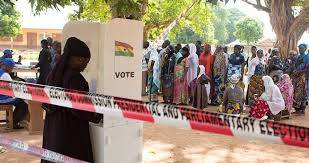Doomsday Awaiting Ghana: Bracing for the 2024 General Elections
As Ghana approaches its 2024 General Elections, the atmosphere is thick with tension and uncertainty. A combination of economic challenges, political rivalry, and societal divisions paints a grim picture for the upcoming polls. With the country's democratic credentials on the line, many Ghanaians are beginning to fear that the elections could usher in a period of instability—one that has the potential to escalate into what some are calling a "doomsday" scenario for the nation.
Economic Challenges
Ghana's economy has been grappling with multiple crises, including high inflation, rising unemployment, and a burgeoning public debt. The cost of living has surged, leaving many citizens struggling to make ends meet. As discontent mounts, the economic hardships have become a potent backdrop for political campaigns. Both the ruling New Patriotic Party (NPP) and the opposition National Democratic Congress (NDC) are under pressure to present credible solutions. However, as politicians trade blame and engage in populist rhetoric, the underlying economic issues remain inadequately addressed.
The International Monetary Fund (IMF) has stepped in with a bailout package, but the stringent conditions attached have not alleviated public concerns. Citizens worry that if their leaders fail to stabilize the economy before the elections, frustration could spill over into unrest. The youth, in particular, are becoming increasingly disillusioned, and their mobilization could ignite protests or violence if they feel their needs are ignored.
Political Rivalries
The political landscape in Ghana has been marked by deep-seated rivalries, especially between the NPP and NDC. Each party has its own loyal base, and this division has often been exploited to incite conflict. The 2020 elections were not without their share of violence, and with the 2024 polls on the horizon, there are fears that similar or even worse outbreaks could occur.
Political rhetoric has become increasingly charged, with accusations flying from both sides. This heightened antagonism could lead to a tense electoral atmosphere, where supporters feel justified in resorting to violence to protect their party's interests. The recent incidents of violence in various regions serve as a reminder of how quickly situations can escalate. The potential for clashes on election day or in the aftermath is a genuine concern for many Ghanaians.
Societal Divisions
Beyond political and economic issues, Ghanaian society is becoming increasingly polarized. Ethnic and regional identities are often manipulated for political gain, contributing to a fragmented national identity. This division has been evident in previous elections, and as parties vie for power, they may deepen these divides, leading to heightened tensions among different groups.
As the election date approaches, there is a growing fear that societal discord could translate into violence. Many Ghanaians remember the brutal aftermath of elections in other countries in the region, and the possibility of similar scenarios unfolding in Ghana cannot be dismissed.
Call for Peaceful Elections
In light of these challenges, it is imperative for Ghanaians to prepare for every possibility. Civic organizations, community leaders, and concerned citizens must play an active role in promoting peaceful dialogue and understanding among different groups. Initiatives aimed at fostering unity and reconciliation can serve as essential counterweights to the rising tide of division.
The Electoral Commission (EC) also has a critical role to play in ensuring that the elections are conducted fairly and transparently. Building public trust in the electoral process is paramount; any perception of bias or misconduct could further inflame tensions and lead to chaos.
The Role of Media
The media also bears significant responsibility in shaping the electoral narrative. Responsible journalism can help counteract the spread of misinformation and inflammatory rhetoric. Media outlets should focus on constructive reporting that highlights solutions rather than merely amplifying conflict.
Conclusion
As Ghana stands on the brink of its 2024 General Elections, the potential for a doomsday scenario is palpable. Economic woes, political rivalries, and societal divisions threaten to overshadow the democratic process. However, it is not too late for Ghanaians to brace for every possibility by fostering unity, engaging in peaceful dialogue, and advocating for fair electoral practices.
The future of the nation rests not only on the shoulders of its leaders but also on the active participation of its citizens. By coming together in solidarity, Ghanaians can work towards ensuring that the upcoming elections are not just a test of political power, but a reaffirmation of their commitment to democracy and peace.



No comments yet
Be the first to share your thoughts!